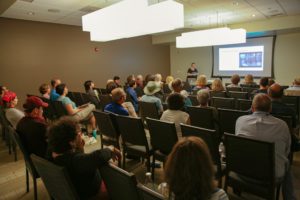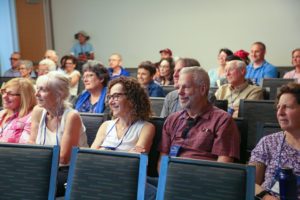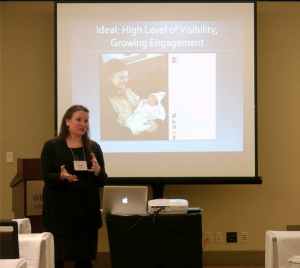Posts tagged jewish

December 1, TVGoneJewy @ American Jewish University
0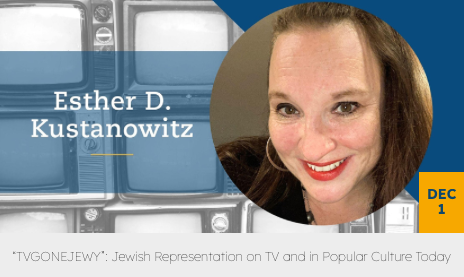
Click link to register.
Join me for a special Hannukah/Hanukkah/Chanukah/?? edition of my session delving into Jewish identity on the small screen. We’ll see how many examples we can get through in 60 minutes!
Wednesday, 12/1/2021 @ 12pm-1pm PST – register in advance and the Zoom invitation will be emailed to you 7 days prior.
More about TVGoneJewy: From unscripted bingeworthy shows to nuanced dramas, Jewish writers and content creators are reclaiming and reshaping Jewish identity on-screen, and audiences are reacting to the increased Jewish representation with enthusiasm and worry, alternating between celebration and condemnation. What do we expect from on-screen Jewish representations of secular and religious Jews and their identities? Why is this happening now? How are creators hitting or missing the mark?

Going Long with TVGoneJewy at Limmud Bay Area Festival
0I arrived at Sonoma State University for the Limmud Bay Area Festival, excited about presenting three sessions to the attendees. But there was one lurking worry: that my first presentation was too long.
I had 70 minutes to cover “TV Gone Jewy” – the exploration of various scenes from contemporary television that mentions Jewish things or talks extensively about Jewish identity. But I definitely had more than 70 minutes of material. I went through the presentation and trimmed – starting clips when the Jewy things happened instead of at their start to provide context, cutting slides here and there. I had also built in about ten minutes at the end for conversation. I could do it in 70 minutes, I thought.
As we met that Friday afternoon as the Jewish conference/festival, gathering several hundred community learners interested in unfiltered or unaffiliated Jewish learning, began, I looked out at the room, about 40 attendees of all ages, Jewish identities and backgrounds and breathed. Here we go.
I spoke quickly, in tribute to my east coast roots, and before I knew it we were at 60 minutes.
“How are we doing on time?” I asked the crowd. “Have a few more minutes?”
“Keep going!” the crowd urged.
“OK,” I said, “but if you need to leave to go to another session, or for whatever reason, we can officially end the session and if people want to stay, you’re welcome but not required. I’ll keep going for whoever stays!”
About five people walked out, waving, smiling and saying thank you. The rest of us continued…for another hour. About 25 people stayed to the very end.
That was just the beginning.

It’s Been A While, But I’m Back…
0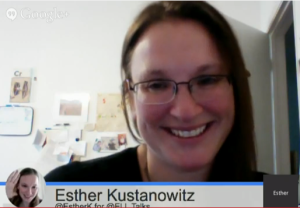 Thanks for your patience while we worked out some technical challenges with EstherK.com – I’m looking forward to bringing you more writing, advice and food for thought in this space over the next few months, and hope you’ll be here to think, learn and laugh with me. Until the fresh content is fully baked, I wanted to share these two videos with you.
Thanks for your patience while we worked out some technical challenges with EstherK.com – I’m looking forward to bringing you more writing, advice and food for thought in this space over the next few months, and hope you’ll be here to think, learn and laugh with me. Until the fresh content is fully baked, I wanted to share these two videos with you.
I’ve started working as freelance community manager for ELI Talks, a program designed to bring TED-style talks and weekly on-air conversations to people who want to explore Jewish engagement, literacy and identity. Most of the time, I’m behind the camera, live-tweeting the weekly conversations (you can see past editions at the ELI Talks website under the section for ELI Talks on Air). But my first run was as an intervieweee – I spoke about my writing on everything from Jewish singles to life after loss; and my next one was as an interviewer, as I spoke to the guys behind the Jewish video site Shmideo. (The links in the previous sentence will take you to MyUrbanKvetch, for the minute-by-minute breakdown, in case you’d like to see a part of the video without sitting down to watch the entire thing. :))
More content to come – looking forward to sharing with you in this space soon! (And a happy Jewish new year to those of you who are celebrating…)

Kicking off January With “Jewish Geography Goes Digital”
0Mid-January arrived, and with it, the RAVSAK/PARDES Jewish educators’ conference – titled “Moving the Needle,” the content contained inspiring speakers, informative panels, deep dives into practical subject matters and workshops designed to give educators a skills upgrade. I was honored to present “Jewish Geography Goes Digital” to an involved and inquisitive group of Jewish educators from across the country – the interactive skills session featured extensive dialogue with those in the room, facilitated sharing of experience using social media in an educational context, and the introduction of new tools and awareness of social media culture as a way to deepen relationships with constituents.
You can check out my presentation below (and additional presentations are available here). And remember, if you’re interested in a consultation on social media culture or tools, creative content strategy, or communications methods for the digital age, please be in touch and we can discuss the possibilities.

Twitter and the College Student Population
0 At the recent JFNA General Assembly in New Orleans, I was asked to speak to a group of student journalists for a program called “Do the Write Thing.” The program features speakers from the world of Jewish leadership as well as from Jewish journalism – the session that I co-headlined (with the Jewish Agency’s Florence Broder) was about social media’s role in today’s Jewish journalism. While all of the students understood and used Facebook, and a few of them were familiar with blogs and the concept of blogging, when it came to Twitter, many of them were clueless. One of the attendees, a writer for the Binghamton University Pipe Dream, wrote a piece for that paper and noted that a junior, double-majoring in history and philosophy, politics and law, “stared blankly when asked about Twitter. ‘I barely know what it is,’ she said. ‘Something about birds?’”
At the recent JFNA General Assembly in New Orleans, I was asked to speak to a group of student journalists for a program called “Do the Write Thing.” The program features speakers from the world of Jewish leadership as well as from Jewish journalism – the session that I co-headlined (with the Jewish Agency’s Florence Broder) was about social media’s role in today’s Jewish journalism. While all of the students understood and used Facebook, and a few of them were familiar with blogs and the concept of blogging, when it came to Twitter, many of them were clueless. One of the attendees, a writer for the Binghamton University Pipe Dream, wrote a piece for that paper and noted that a junior, double-majoring in history and philosophy, politics and law, “stared blankly when asked about Twitter. ‘I barely know what it is,’ she said. ‘Something about birds?’”
While the students in the room at DTWT weren’t quite at that level of Twitter illiteracy, their lack of facility – and maybe even interest? – in the tool known as Twitter illustrates a point. Not every person who is young is active in all forms of social media. And while Facebook may be an exception, there is no one social media tool that is being used actively by all young people.
What organizations can take away from this is that although young people are involved in social media, social media is not the universal tool through which a project or organization can reach all young people. Today’s organizations must be educated about the tools that are out there, and know how to use them – but organizations need to adopt flexibility in creating their social media strategies, matching the available time and energy of their staffs to the likely payoff in each of the markets for tools like Twitter, Facebook, LinkedIn, etc.
Social media consultants can help, but so can members of your target demo. Use the tools that are out there – search Twitter and Facebook for conversations relevant to your product or program. And convene focus groups of people in the relevant demo – ask them how they prefer to get information and how they use these tools. Once you know where the people you want to reach dwell, you can know how to knock on the door.
“Globalizing the Shtetl” Presentation Now on SlideShare
0I gave this presentation, “Globalizing the Shtetl,” at the 2010 Jewish Communal Professionals of Southern California Conference, held October 28, 2010 in Malibu, CA.

New Jewish Year, New Work Opportunities
10113 degrees Monday in Los Angeles. I tell you, I’ve had it with this heat. Today, I’m working from an air conditioned office building where I’ll likely have to wear a sweater.
So I’m heading to that office building on Wilshire Boulevard. And I’ll be there four days a week.

(Said work may also include making more films that look like this one, a result of an NEI iMovie workshop several months ago).
“Disconnect to Connect” – Unplugging for the Sabbath
0The Jewish Standard recently asked for my comments about whether people are too technology-reliant these days, and how it can impact Jewish connections and community.
People first used e-mail, for example, to keep in touch with others they wouldn’t otherwise reach, Kustanowitz said.
“It was a way to mass-produce these kinds of communications that were still about continuing a relationship and adding value to a relationship,” she said.
Such developments have led to what Kustanowitz called an over-reliance on technology, without a sense of deliberation or thought. Just as Jews are supposed to have a certain amount of kavanah, intent, when they pray, she said, so, too, should people have a sense of kavanah when sending out e-mail and posting to social networking Websites.
To read the entire article, visit the Jewish Standard online.
Esther’s Sessions at LimmudLA – Including Dates and Times
0Join me for my sessions at this weekend’s LimmudLA conference….
The Innovation Ecosystem: A 21st Century Organic Jewish Community
Joshua Avedon, Yoni Gordis, Esther Kustanowitz, Naomi Less, Scott Perlo
Saturday 12:30 PM–1:45 PM
Identity and Responsibility, Teen Approved
Over the past decade or so, the Jewish world has witnessed the emergence of a new landscape of innovative startups. These enterprises have created new entry points to Jewish life, and new ways of building Jewish community. This diverse and vibrant collective of new Jewish initiatives is evolving into an organic communal infrastructure for the Jewish community in the 21st century. This session is a tour though the diverse and vibrant ecosystem driving Jewish innovation across the globe. Meet some of the innovators and find out how their work is changing the Jewish world.
Jews’ Line Is It Anyway?
Saturday 2:00 PM–3:15 PM
Arts and Performance, Teen Approved
What’s so Jewish about basic improv comedy? This informal, participatory workshop introduces the basics of both improv comedy and Jewish community to Jews and Judeophiles of all ages.
Finding Your Inner Megillah
Monday 11:30 AM–12:45 PM
Identity and Responsibility, Teen Approved
There’s a megillah inside every Jew, not just those named Ruth and Esther. Jews are natural storytellers because our faith is based in oral and then written history. But what makes a story worth telling and retelling, generation after generation? In this experimental writing workshop, visit some noteworthy texts from Jewish tradition and engage in free-writing exercises based on and inspired by those texts.
Hope to see you there…
